Analyzing Facebook's Impact on Travel Planning with Firstchoice Ltd
VerifiedAdded on 2024/06/05
|34
|6911
|423
Report
AI Summary
This research report investigates the impact of Facebook on travel planning by travelers, focusing on Firstchoice Ltd. It addresses the increasing use of technology in the travel industry and how social media platforms like Facebook influence travel decisions. The study formulates research questions and hypotheses to examine the reasons for using Facebook for travel planning, the link between Facebook usage and travel choices, the impact of feedback and reviews, the level of satisfaction among travelers, and the trustworthiness of Facebook as a source of holiday-related information. The methodology involves both primary data collection through online surveys and secondary data collection from journals, articles, and academic books. The research aims to provide insights into how Firstchoice Ltd can leverage Facebook to enhance customer engagement and satisfaction by understanding the role of social media in travel planning.
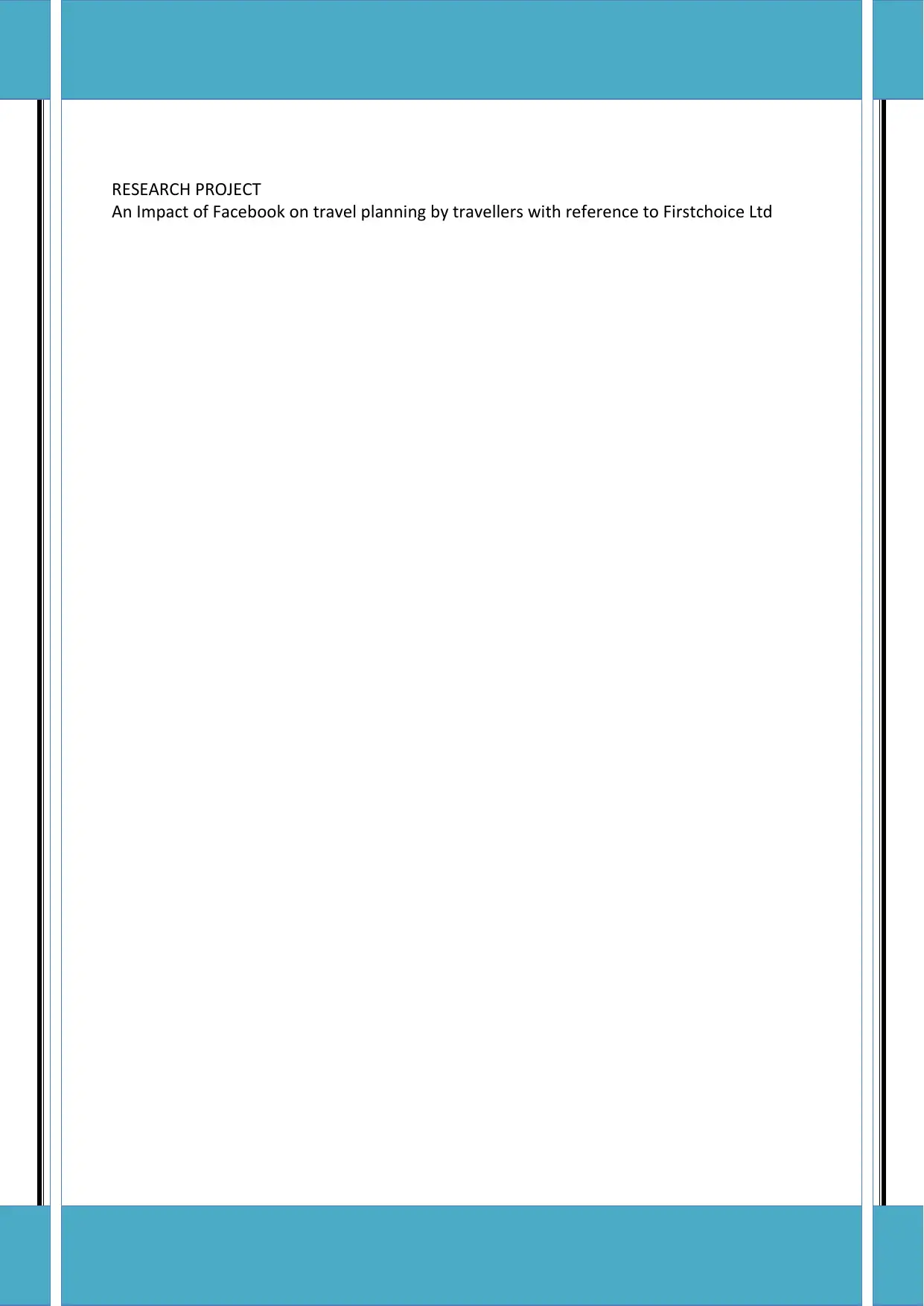
RESEARCH PROJECT
An Impact of Facebook on travel planning by travellers with reference to Firstchoice Ltd
An Impact of Facebook on travel planning by travellers with reference to Firstchoice Ltd
Paraphrase This Document
Need a fresh take? Get an instant paraphrase of this document with our AI Paraphraser
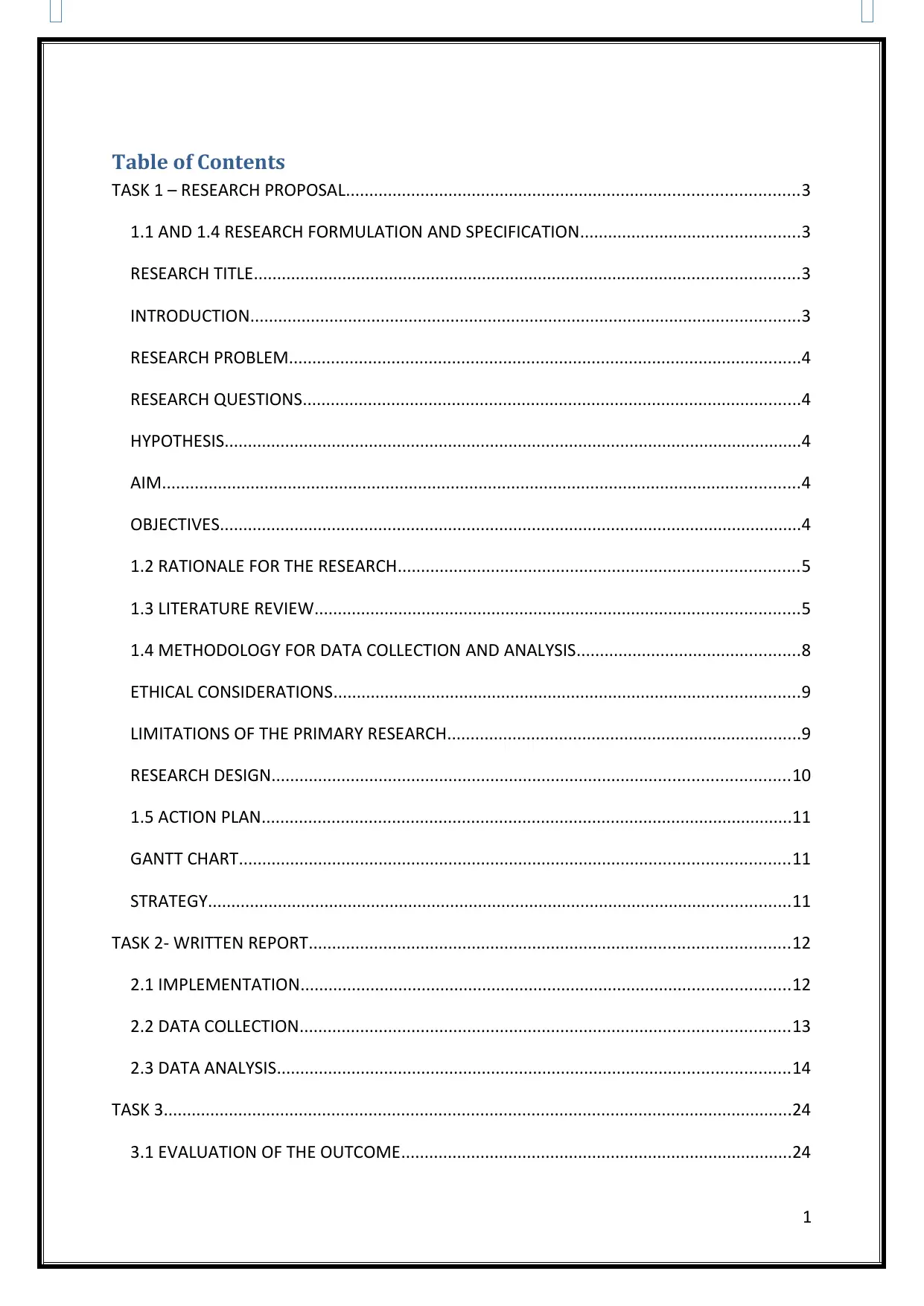
Table of Contents
TASK 1 – RESEARCH PROPOSAL.................................................................................................3
1.1 AND 1.4 RESEARCH FORMULATION AND SPECIFICATION...............................................3
RESEARCH TITLE.....................................................................................................................3
INTRODUCTION......................................................................................................................3
RESEARCH PROBLEM..............................................................................................................4
RESEARCH QUESTIONS...........................................................................................................4
HYPOTHESIS............................................................................................................................4
AIM.........................................................................................................................................4
OBJECTIVES.............................................................................................................................4
1.2 RATIONALE FOR THE RESEARCH......................................................................................5
1.3 LITERATURE REVIEW........................................................................................................5
1.4 METHODOLOGY FOR DATA COLLECTION AND ANALYSIS................................................8
ETHICAL CONSIDERATIONS....................................................................................................9
LIMITATIONS OF THE PRIMARY RESEARCH............................................................................9
RESEARCH DESIGN...............................................................................................................10
1.5 ACTION PLAN..................................................................................................................11
GANTT CHART......................................................................................................................11
STRATEGY.............................................................................................................................11
TASK 2- WRITTEN REPORT.......................................................................................................12
2.1 IMPLEMENTATION.........................................................................................................12
2.2 DATA COLLECTION.........................................................................................................13
2.3 DATA ANALYSIS..............................................................................................................14
TASK 3.......................................................................................................................................24
3.1 EVALUATION OF THE OUTCOME....................................................................................24
1
TASK 1 – RESEARCH PROPOSAL.................................................................................................3
1.1 AND 1.4 RESEARCH FORMULATION AND SPECIFICATION...............................................3
RESEARCH TITLE.....................................................................................................................3
INTRODUCTION......................................................................................................................3
RESEARCH PROBLEM..............................................................................................................4
RESEARCH QUESTIONS...........................................................................................................4
HYPOTHESIS............................................................................................................................4
AIM.........................................................................................................................................4
OBJECTIVES.............................................................................................................................4
1.2 RATIONALE FOR THE RESEARCH......................................................................................5
1.3 LITERATURE REVIEW........................................................................................................5
1.4 METHODOLOGY FOR DATA COLLECTION AND ANALYSIS................................................8
ETHICAL CONSIDERATIONS....................................................................................................9
LIMITATIONS OF THE PRIMARY RESEARCH............................................................................9
RESEARCH DESIGN...............................................................................................................10
1.5 ACTION PLAN..................................................................................................................11
GANTT CHART......................................................................................................................11
STRATEGY.............................................................................................................................11
TASK 2- WRITTEN REPORT.......................................................................................................12
2.1 IMPLEMENTATION.........................................................................................................12
2.2 DATA COLLECTION.........................................................................................................13
2.3 DATA ANALYSIS..............................................................................................................14
TASK 3.......................................................................................................................................24
3.1 EVALUATION OF THE OUTCOME....................................................................................24
1
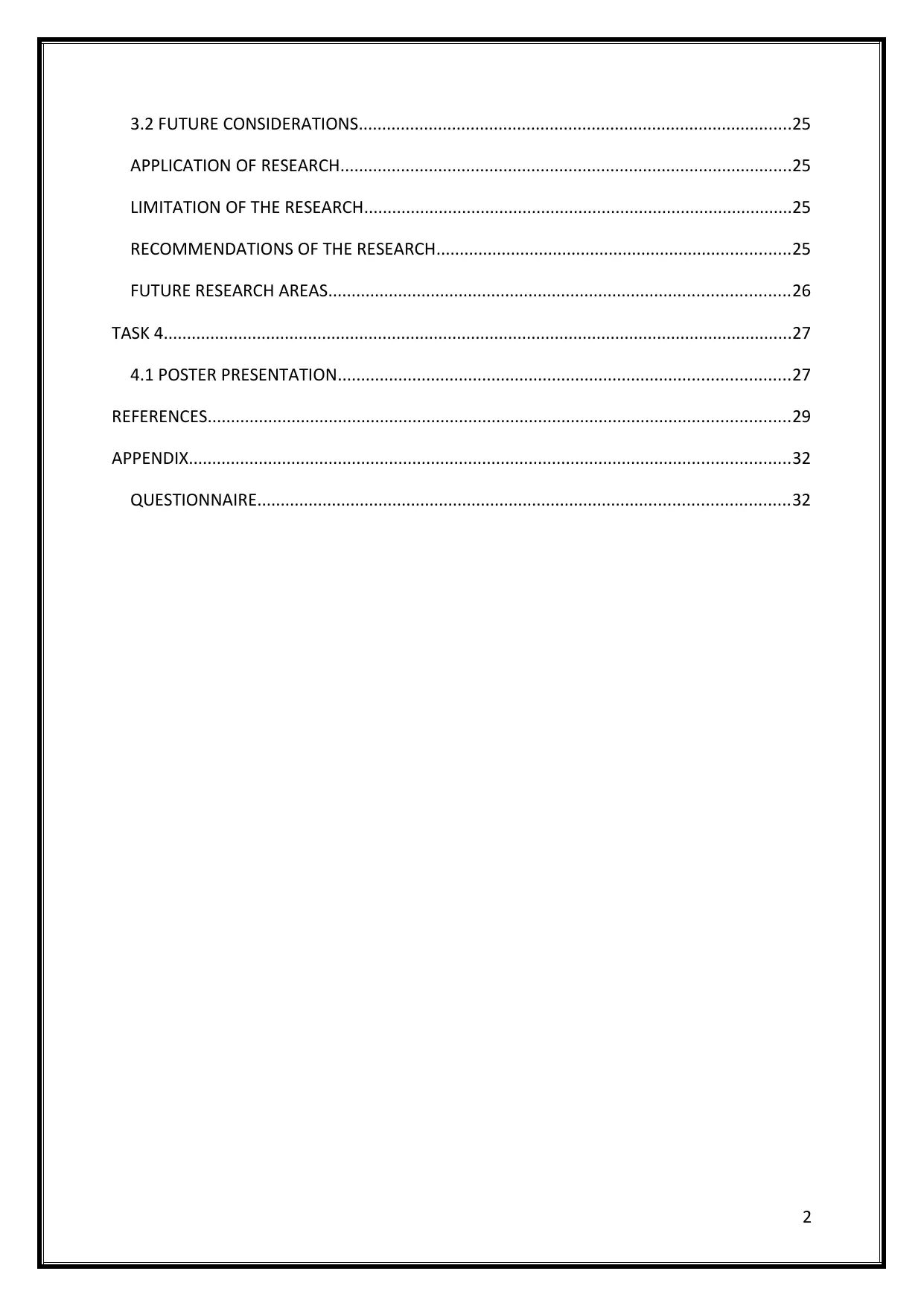
3.2 FUTURE CONSIDERATIONS.............................................................................................25
APPLICATION OF RESEARCH.................................................................................................25
LIMITATION OF THE RESEARCH............................................................................................25
RECOMMENDATIONS OF THE RESEARCH............................................................................25
FUTURE RESEARCH AREAS...................................................................................................26
TASK 4.......................................................................................................................................27
4.1 POSTER PRESENTATION.................................................................................................27
REFERENCES.............................................................................................................................29
APPENDIX.................................................................................................................................32
QUESTIONNAIRE..................................................................................................................32
2
APPLICATION OF RESEARCH.................................................................................................25
LIMITATION OF THE RESEARCH............................................................................................25
RECOMMENDATIONS OF THE RESEARCH............................................................................25
FUTURE RESEARCH AREAS...................................................................................................26
TASK 4.......................................................................................................................................27
4.1 POSTER PRESENTATION.................................................................................................27
REFERENCES.............................................................................................................................29
APPENDIX.................................................................................................................................32
QUESTIONNAIRE..................................................................................................................32
2
⊘ This is a preview!⊘
Do you want full access?
Subscribe today to unlock all pages.

Trusted by 1+ million students worldwide
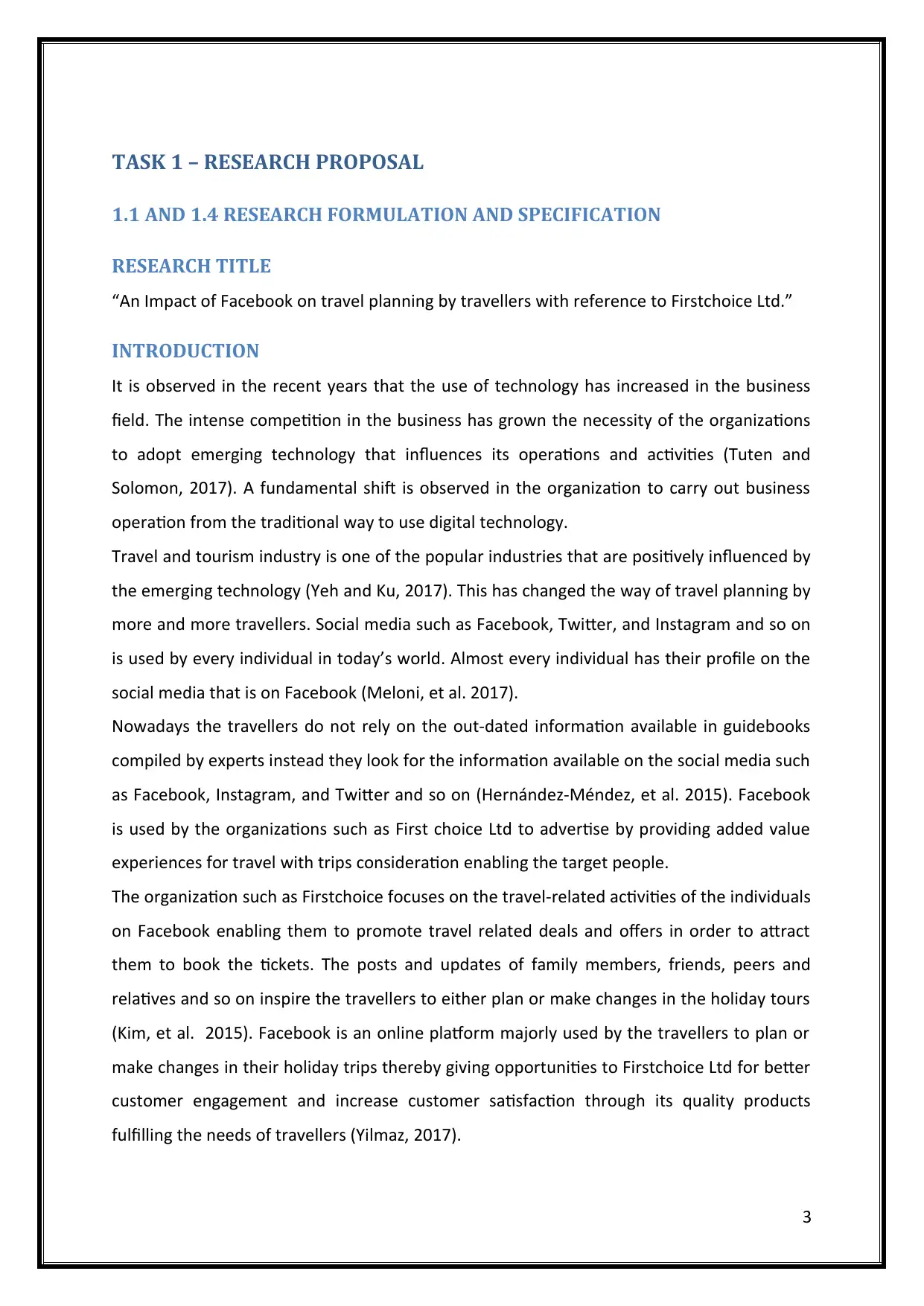
TASK 1 – RESEARCH PROPOSAL
1.1 AND 1.4 RESEARCH FORMULATION AND SPECIFICATION
RESEARCH TITLE
“An Impact of Facebook on travel planning by travellers with reference to Firstchoice Ltd.”
INTRODUCTION
It is observed in the recent years that the use of technology has increased in the business
field. The intense competition in the business has grown the necessity of the organizations
to adopt emerging technology that influences its operations and activities (Tuten and
Solomon, 2017). A fundamental shift is observed in the organization to carry out business
operation from the traditional way to use digital technology.
Travel and tourism industry is one of the popular industries that are positively influenced by
the emerging technology (Yeh and Ku, 2017). This has changed the way of travel planning by
more and more travellers. Social media such as Facebook, Twitter, and Instagram and so on
is used by every individual in today’s world. Almost every individual has their profile on the
social media that is on Facebook (Meloni, et al. 2017).
Nowadays the travellers do not rely on the out-dated information available in guidebooks
compiled by experts instead they look for the information available on the social media such
as Facebook, Instagram, and Twitter and so on (Hernández-Méndez, et al. 2015). Facebook
is used by the organizations such as First choice Ltd to advertise by providing added value
experiences for travel with trips consideration enabling the target people.
The organization such as Firstchoice focuses on the travel-related activities of the individuals
on Facebook enabling them to promote travel related deals and offers in order to attract
them to book the tickets. The posts and updates of family members, friends, peers and
relatives and so on inspire the travellers to either plan or make changes in the holiday tours
(Kim, et al. 2015). Facebook is an online platform majorly used by the travellers to plan or
make changes in their holiday trips thereby giving opportunities to Firstchoice Ltd for better
customer engagement and increase customer satisfaction through its quality products
fulfilling the needs of travellers (Yilmaz, 2017).
3
1.1 AND 1.4 RESEARCH FORMULATION AND SPECIFICATION
RESEARCH TITLE
“An Impact of Facebook on travel planning by travellers with reference to Firstchoice Ltd.”
INTRODUCTION
It is observed in the recent years that the use of technology has increased in the business
field. The intense competition in the business has grown the necessity of the organizations
to adopt emerging technology that influences its operations and activities (Tuten and
Solomon, 2017). A fundamental shift is observed in the organization to carry out business
operation from the traditional way to use digital technology.
Travel and tourism industry is one of the popular industries that are positively influenced by
the emerging technology (Yeh and Ku, 2017). This has changed the way of travel planning by
more and more travellers. Social media such as Facebook, Twitter, and Instagram and so on
is used by every individual in today’s world. Almost every individual has their profile on the
social media that is on Facebook (Meloni, et al. 2017).
Nowadays the travellers do not rely on the out-dated information available in guidebooks
compiled by experts instead they look for the information available on the social media such
as Facebook, Instagram, and Twitter and so on (Hernández-Méndez, et al. 2015). Facebook
is used by the organizations such as First choice Ltd to advertise by providing added value
experiences for travel with trips consideration enabling the target people.
The organization such as Firstchoice focuses on the travel-related activities of the individuals
on Facebook enabling them to promote travel related deals and offers in order to attract
them to book the tickets. The posts and updates of family members, friends, peers and
relatives and so on inspire the travellers to either plan or make changes in the holiday tours
(Kim, et al. 2015). Facebook is an online platform majorly used by the travellers to plan or
make changes in their holiday trips thereby giving opportunities to Firstchoice Ltd for better
customer engagement and increase customer satisfaction through its quality products
fulfilling the needs of travellers (Yilmaz, 2017).
3
Paraphrase This Document
Need a fresh take? Get an instant paraphrase of this document with our AI Paraphraser
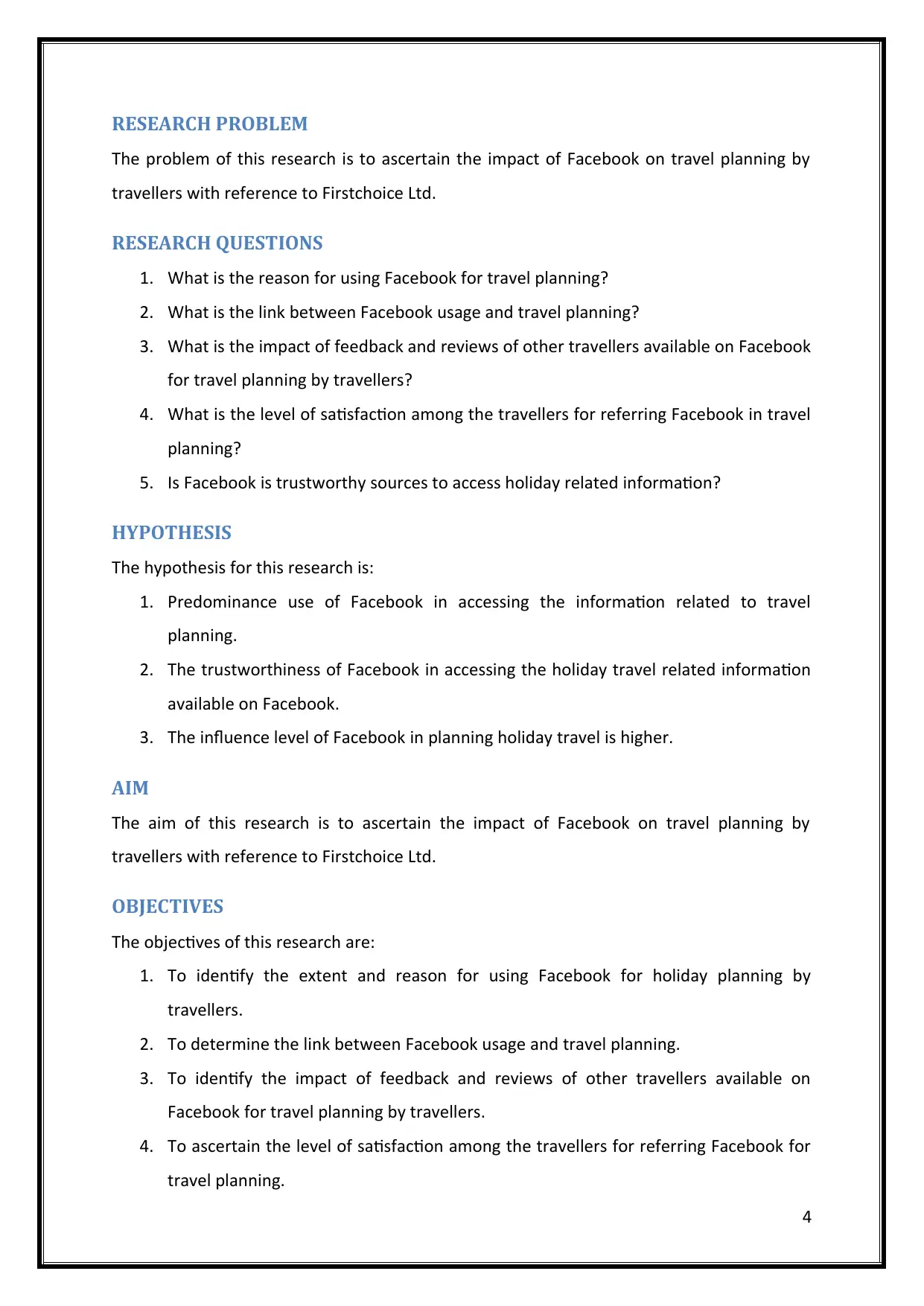
RESEARCH PROBLEM
The problem of this research is to ascertain the impact of Facebook on travel planning by
travellers with reference to Firstchoice Ltd.
RESEARCH QUESTIONS
1. What is the reason for using Facebook for travel planning?
2. What is the link between Facebook usage and travel planning?
3. What is the impact of feedback and reviews of other travellers available on Facebook
for travel planning by travellers?
4. What is the level of satisfaction among the travellers for referring Facebook in travel
planning?
5. Is Facebook is trustworthy sources to access holiday related information?
HYPOTHESIS
The hypothesis for this research is:
1. Predominance use of Facebook in accessing the information related to travel
planning.
2. The trustworthiness of Facebook in accessing the holiday travel related information
available on Facebook.
3. The influence level of Facebook in planning holiday travel is higher.
AIM
The aim of this research is to ascertain the impact of Facebook on travel planning by
travellers with reference to Firstchoice Ltd.
OBJECTIVES
The objectives of this research are:
1. To identify the extent and reason for using Facebook for holiday planning by
travellers.
2. To determine the link between Facebook usage and travel planning.
3. To identify the impact of feedback and reviews of other travellers available on
Facebook for travel planning by travellers.
4. To ascertain the level of satisfaction among the travellers for referring Facebook for
travel planning.
4
The problem of this research is to ascertain the impact of Facebook on travel planning by
travellers with reference to Firstchoice Ltd.
RESEARCH QUESTIONS
1. What is the reason for using Facebook for travel planning?
2. What is the link between Facebook usage and travel planning?
3. What is the impact of feedback and reviews of other travellers available on Facebook
for travel planning by travellers?
4. What is the level of satisfaction among the travellers for referring Facebook in travel
planning?
5. Is Facebook is trustworthy sources to access holiday related information?
HYPOTHESIS
The hypothesis for this research is:
1. Predominance use of Facebook in accessing the information related to travel
planning.
2. The trustworthiness of Facebook in accessing the holiday travel related information
available on Facebook.
3. The influence level of Facebook in planning holiday travel is higher.
AIM
The aim of this research is to ascertain the impact of Facebook on travel planning by
travellers with reference to Firstchoice Ltd.
OBJECTIVES
The objectives of this research are:
1. To identify the extent and reason for using Facebook for holiday planning by
travellers.
2. To determine the link between Facebook usage and travel planning.
3. To identify the impact of feedback and reviews of other travellers available on
Facebook for travel planning by travellers.
4. To ascertain the level of satisfaction among the travellers for referring Facebook for
travel planning.
4
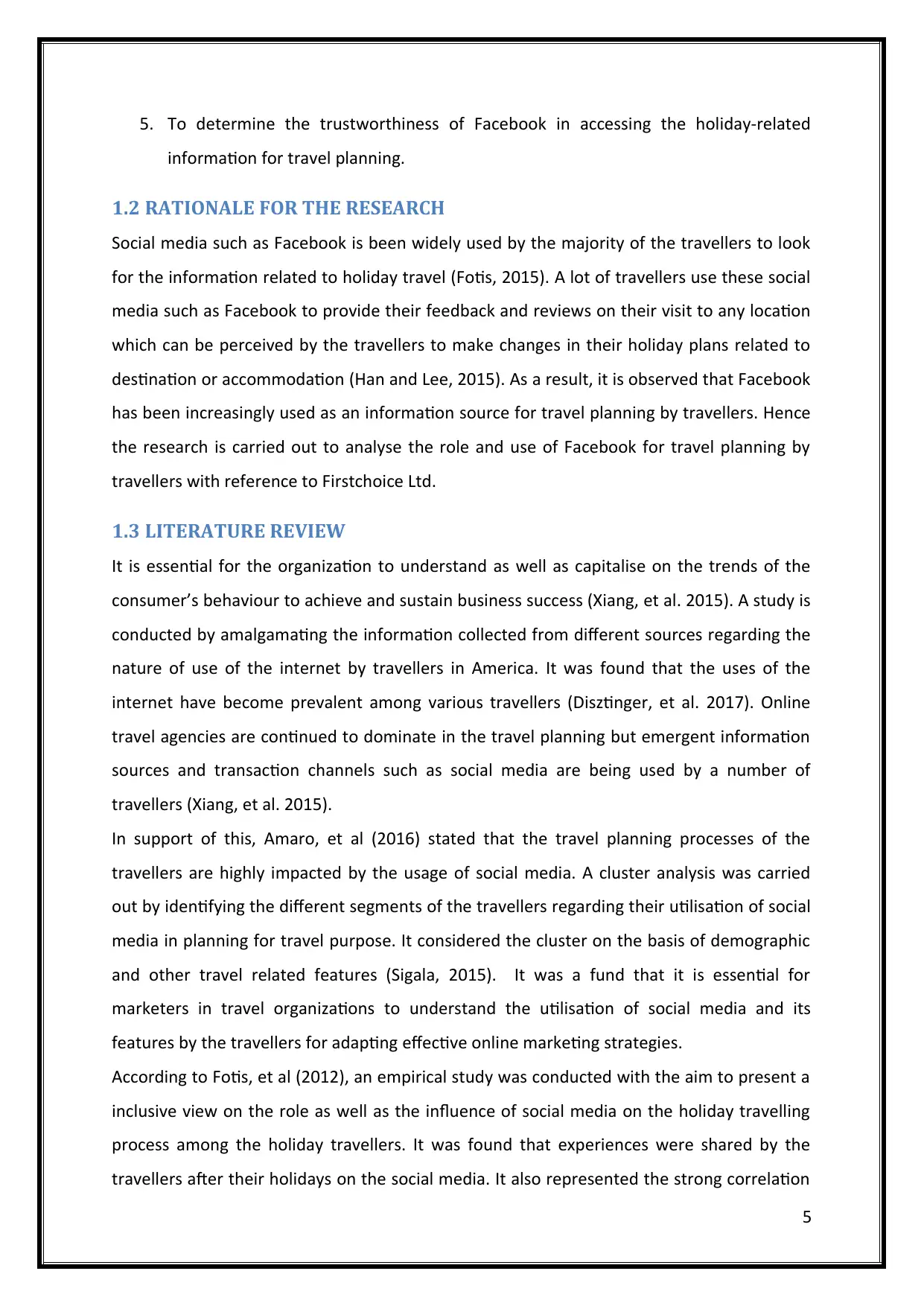
5. To determine the trustworthiness of Facebook in accessing the holiday-related
information for travel planning.
1.2 RATIONALE FOR THE RESEARCH
Social media such as Facebook is been widely used by the majority of the travellers to look
for the information related to holiday travel (Fotis, 2015). A lot of travellers use these social
media such as Facebook to provide their feedback and reviews on their visit to any location
which can be perceived by the travellers to make changes in their holiday plans related to
destination or accommodation (Han and Lee, 2015). As a result, it is observed that Facebook
has been increasingly used as an information source for travel planning by travellers. Hence
the research is carried out to analyse the role and use of Facebook for travel planning by
travellers with reference to Firstchoice Ltd.
1.3 LITERATURE REVIEW
It is essential for the organization to understand as well as capitalise on the trends of the
consumer’s behaviour to achieve and sustain business success (Xiang, et al. 2015). A study is
conducted by amalgamating the information collected from different sources regarding the
nature of use of the internet by travellers in America. It was found that the uses of the
internet have become prevalent among various travellers (Disztinger, et al. 2017). Online
travel agencies are continued to dominate in the travel planning but emergent information
sources and transaction channels such as social media are being used by a number of
travellers (Xiang, et al. 2015).
In support of this, Amaro, et al (2016) stated that the travel planning processes of the
travellers are highly impacted by the usage of social media. A cluster analysis was carried
out by identifying the different segments of the travellers regarding their utilisation of social
media in planning for travel purpose. It considered the cluster on the basis of demographic
and other travel related features (Sigala, 2015). It was a fund that it is essential for
marketers in travel organizations to understand the utilisation of social media and its
features by the travellers for adapting effective online marketing strategies.
According to Fotis, et al (2012), an empirical study was conducted with the aim to present a
inclusive view on the role as well as the influence of social media on the holiday travelling
process among the holiday travellers. It was found that experiences were shared by the
travellers after their holidays on the social media. It also represented the strong correlation
5
information for travel planning.
1.2 RATIONALE FOR THE RESEARCH
Social media such as Facebook is been widely used by the majority of the travellers to look
for the information related to holiday travel (Fotis, 2015). A lot of travellers use these social
media such as Facebook to provide their feedback and reviews on their visit to any location
which can be perceived by the travellers to make changes in their holiday plans related to
destination or accommodation (Han and Lee, 2015). As a result, it is observed that Facebook
has been increasingly used as an information source for travel planning by travellers. Hence
the research is carried out to analyse the role and use of Facebook for travel planning by
travellers with reference to Firstchoice Ltd.
1.3 LITERATURE REVIEW
It is essential for the organization to understand as well as capitalise on the trends of the
consumer’s behaviour to achieve and sustain business success (Xiang, et al. 2015). A study is
conducted by amalgamating the information collected from different sources regarding the
nature of use of the internet by travellers in America. It was found that the uses of the
internet have become prevalent among various travellers (Disztinger, et al. 2017). Online
travel agencies are continued to dominate in the travel planning but emergent information
sources and transaction channels such as social media are being used by a number of
travellers (Xiang, et al. 2015).
In support of this, Amaro, et al (2016) stated that the travel planning processes of the
travellers are highly impacted by the usage of social media. A cluster analysis was carried
out by identifying the different segments of the travellers regarding their utilisation of social
media in planning for travel purpose. It considered the cluster on the basis of demographic
and other travel related features (Sigala, 2015). It was a fund that it is essential for
marketers in travel organizations to understand the utilisation of social media and its
features by the travellers for adapting effective online marketing strategies.
According to Fotis, et al (2012), an empirical study was conducted with the aim to present a
inclusive view on the role as well as the influence of social media on the holiday travelling
process among the holiday travellers. It was found that experiences were shared by the
travellers after their holidays on the social media. It also represented the strong correlation
5
⊘ This is a preview!⊘
Do you want full access?
Subscribe today to unlock all pages.

Trusted by 1+ million students worldwide
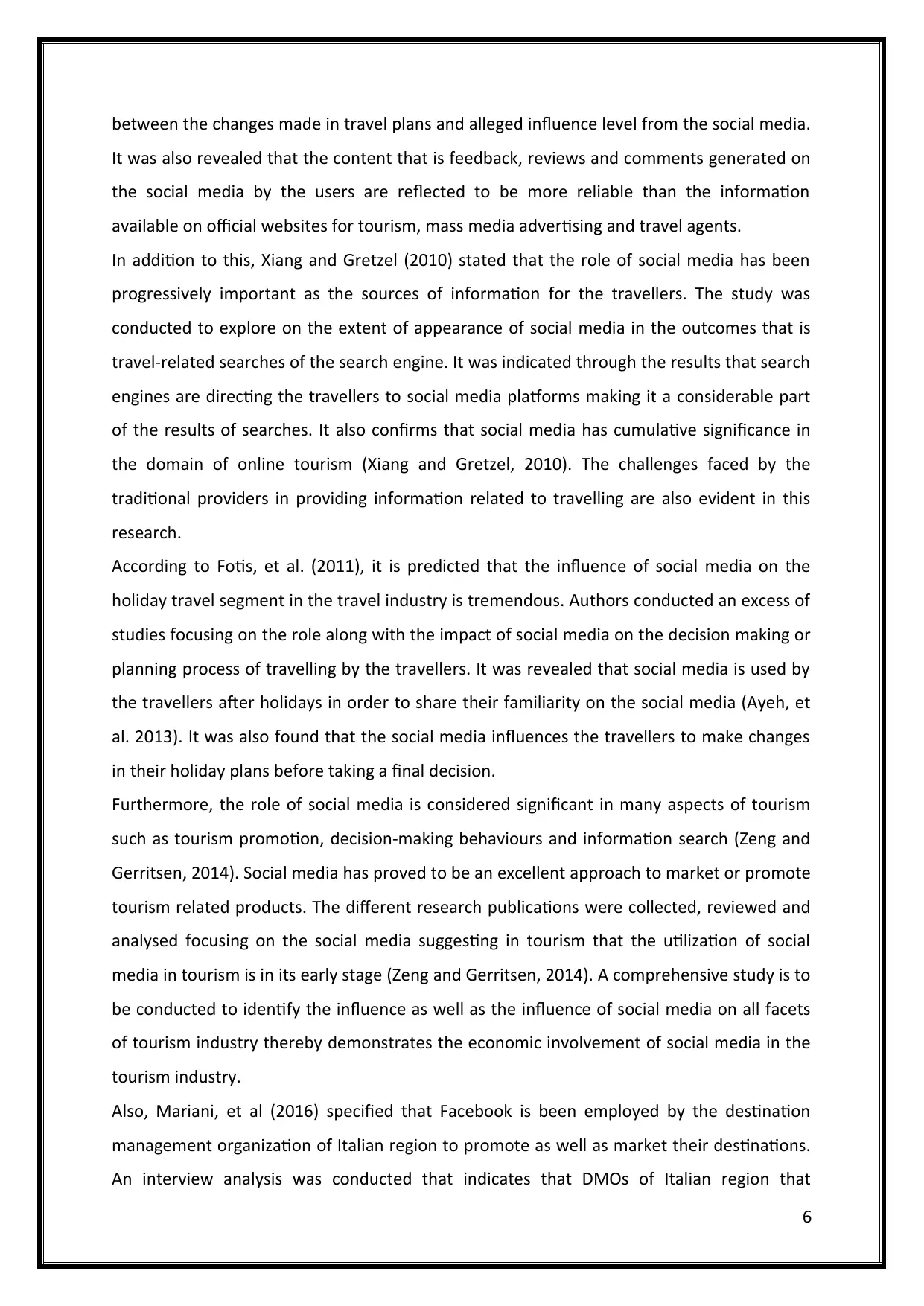
between the changes made in travel plans and alleged influence level from the social media.
It was also revealed that the content that is feedback, reviews and comments generated on
the social media by the users are reflected to be more reliable than the information
available on official websites for tourism, mass media advertising and travel agents.
In addition to this, Xiang and Gretzel (2010) stated that the role of social media has been
progressively important as the sources of information for the travellers. The study was
conducted to explore on the extent of appearance of social media in the outcomes that is
travel-related searches of the search engine. It was indicated through the results that search
engines are directing the travellers to social media platforms making it a considerable part
of the results of searches. It also confirms that social media has cumulative significance in
the domain of online tourism (Xiang and Gretzel, 2010). The challenges faced by the
traditional providers in providing information related to travelling are also evident in this
research.
According to Fotis, et al. (2011), it is predicted that the influence of social media on the
holiday travel segment in the travel industry is tremendous. Authors conducted an excess of
studies focusing on the role along with the impact of social media on the decision making or
planning process of travelling by the travellers. It was revealed that social media is used by
the travellers after holidays in order to share their familiarity on the social media (Ayeh, et
al. 2013). It was also found that the social media influences the travellers to make changes
in their holiday plans before taking a final decision.
Furthermore, the role of social media is considered significant in many aspects of tourism
such as tourism promotion, decision-making behaviours and information search (Zeng and
Gerritsen, 2014). Social media has proved to be an excellent approach to market or promote
tourism related products. The different research publications were collected, reviewed and
analysed focusing on the social media suggesting in tourism that the utilization of social
media in tourism is in its early stage (Zeng and Gerritsen, 2014). A comprehensive study is to
be conducted to identify the influence as well as the influence of social media on all facets
of tourism industry thereby demonstrates the economic involvement of social media in the
tourism industry.
Also, Mariani, et al (2016) specified that Facebook is been employed by the destination
management organization of Italian region to promote as well as market their destinations.
An interview analysis was conducted that indicates that DMOs of Italian region that
6
It was also revealed that the content that is feedback, reviews and comments generated on
the social media by the users are reflected to be more reliable than the information
available on official websites for tourism, mass media advertising and travel agents.
In addition to this, Xiang and Gretzel (2010) stated that the role of social media has been
progressively important as the sources of information for the travellers. The study was
conducted to explore on the extent of appearance of social media in the outcomes that is
travel-related searches of the search engine. It was indicated through the results that search
engines are directing the travellers to social media platforms making it a considerable part
of the results of searches. It also confirms that social media has cumulative significance in
the domain of online tourism (Xiang and Gretzel, 2010). The challenges faced by the
traditional providers in providing information related to travelling are also evident in this
research.
According to Fotis, et al. (2011), it is predicted that the influence of social media on the
holiday travel segment in the travel industry is tremendous. Authors conducted an excess of
studies focusing on the role along with the impact of social media on the decision making or
planning process of travelling by the travellers. It was revealed that social media is used by
the travellers after holidays in order to share their familiarity on the social media (Ayeh, et
al. 2013). It was also found that the social media influences the travellers to make changes
in their holiday plans before taking a final decision.
Furthermore, the role of social media is considered significant in many aspects of tourism
such as tourism promotion, decision-making behaviours and information search (Zeng and
Gerritsen, 2014). Social media has proved to be an excellent approach to market or promote
tourism related products. The different research publications were collected, reviewed and
analysed focusing on the social media suggesting in tourism that the utilization of social
media in tourism is in its early stage (Zeng and Gerritsen, 2014). A comprehensive study is to
be conducted to identify the influence as well as the influence of social media on all facets
of tourism industry thereby demonstrates the economic involvement of social media in the
tourism industry.
Also, Mariani, et al (2016) specified that Facebook is been employed by the destination
management organization of Italian region to promote as well as market their destinations.
An interview analysis was conducted that indicates that DMOs of Italian region that
6
Paraphrase This Document
Need a fresh take? Get an instant paraphrase of this document with our AI Paraphraser

employed the Facebook varies in terms of tactics and strategy. It was found that the
Facebook engagement of DMOs was positively impacted due to moderate long posts
however high post frequency as well as early daily timing of the posts had adverse impacts
on the Facebook engagement (Mariani, et al. 2016).
In support of this, Jadhav, et al (2018) carried a survey thereby focusing on the Facebook
along with its impact on the travel behaviour of the residents of Singapore. It was observed
that the usage of social media resulted in a fundamental change in the leisure travel
behaviour of the residents of Singapore (Leung, et al. 2013). It was indicated from the
findings that it has a resilient impact on the behaviours of the residents with respect to the
itinerary planning, frequency of travel along with social sharing; it did not have an impact on
selecting a destination in travel planning.
7
Facebook engagement of DMOs was positively impacted due to moderate long posts
however high post frequency as well as early daily timing of the posts had adverse impacts
on the Facebook engagement (Mariani, et al. 2016).
In support of this, Jadhav, et al (2018) carried a survey thereby focusing on the Facebook
along with its impact on the travel behaviour of the residents of Singapore. It was observed
that the usage of social media resulted in a fundamental change in the leisure travel
behaviour of the residents of Singapore (Leung, et al. 2013). It was indicated from the
findings that it has a resilient impact on the behaviours of the residents with respect to the
itinerary planning, frequency of travel along with social sharing; it did not have an impact on
selecting a destination in travel planning.
7
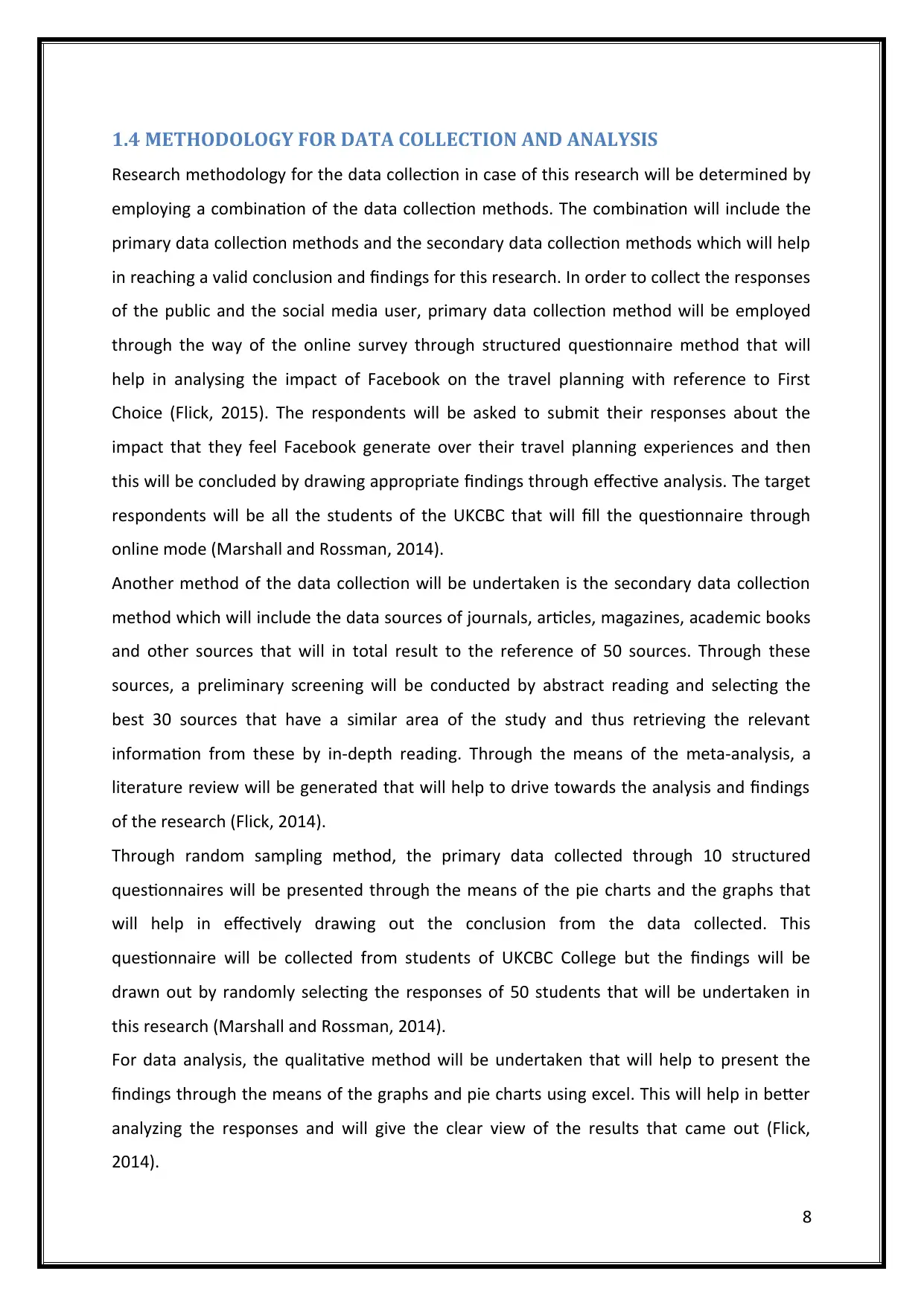
1.4 METHODOLOGY FOR DATA COLLECTION AND ANALYSIS
Research methodology for the data collection in case of this research will be determined by
employing a combination of the data collection methods. The combination will include the
primary data collection methods and the secondary data collection methods which will help
in reaching a valid conclusion and findings for this research. In order to collect the responses
of the public and the social media user, primary data collection method will be employed
through the way of the online survey through structured questionnaire method that will
help in analysing the impact of Facebook on the travel planning with reference to First
Choice (Flick, 2015). The respondents will be asked to submit their responses about the
impact that they feel Facebook generate over their travel planning experiences and then
this will be concluded by drawing appropriate findings through effective analysis. The target
respondents will be all the students of the UKCBC that will fill the questionnaire through
online mode (Marshall and Rossman, 2014).
Another method of the data collection will be undertaken is the secondary data collection
method which will include the data sources of journals, articles, magazines, academic books
and other sources that will in total result to the reference of 50 sources. Through these
sources, a preliminary screening will be conducted by abstract reading and selecting the
best 30 sources that have a similar area of the study and thus retrieving the relevant
information from these by in-depth reading. Through the means of the meta-analysis, a
literature review will be generated that will help to drive towards the analysis and findings
of the research (Flick, 2014).
Through random sampling method, the primary data collected through 10 structured
questionnaires will be presented through the means of the pie charts and the graphs that
will help in effectively drawing out the conclusion from the data collected. This
questionnaire will be collected from students of UKCBC College but the findings will be
drawn out by randomly selecting the responses of 50 students that will be undertaken in
this research (Marshall and Rossman, 2014).
For data analysis, the qualitative method will be undertaken that will help to present the
findings through the means of the graphs and pie charts using excel. This will help in better
analyzing the responses and will give the clear view of the results that came out (Flick,
2014).
8
Research methodology for the data collection in case of this research will be determined by
employing a combination of the data collection methods. The combination will include the
primary data collection methods and the secondary data collection methods which will help
in reaching a valid conclusion and findings for this research. In order to collect the responses
of the public and the social media user, primary data collection method will be employed
through the way of the online survey through structured questionnaire method that will
help in analysing the impact of Facebook on the travel planning with reference to First
Choice (Flick, 2015). The respondents will be asked to submit their responses about the
impact that they feel Facebook generate over their travel planning experiences and then
this will be concluded by drawing appropriate findings through effective analysis. The target
respondents will be all the students of the UKCBC that will fill the questionnaire through
online mode (Marshall and Rossman, 2014).
Another method of the data collection will be undertaken is the secondary data collection
method which will include the data sources of journals, articles, magazines, academic books
and other sources that will in total result to the reference of 50 sources. Through these
sources, a preliminary screening will be conducted by abstract reading and selecting the
best 30 sources that have a similar area of the study and thus retrieving the relevant
information from these by in-depth reading. Through the means of the meta-analysis, a
literature review will be generated that will help to drive towards the analysis and findings
of the research (Flick, 2014).
Through random sampling method, the primary data collected through 10 structured
questionnaires will be presented through the means of the pie charts and the graphs that
will help in effectively drawing out the conclusion from the data collected. This
questionnaire will be collected from students of UKCBC College but the findings will be
drawn out by randomly selecting the responses of 50 students that will be undertaken in
this research (Marshall and Rossman, 2014).
For data analysis, the qualitative method will be undertaken that will help to present the
findings through the means of the graphs and pie charts using excel. This will help in better
analyzing the responses and will give the clear view of the results that came out (Flick,
2014).
8
⊘ This is a preview!⊘
Do you want full access?
Subscribe today to unlock all pages.

Trusted by 1+ million students worldwide
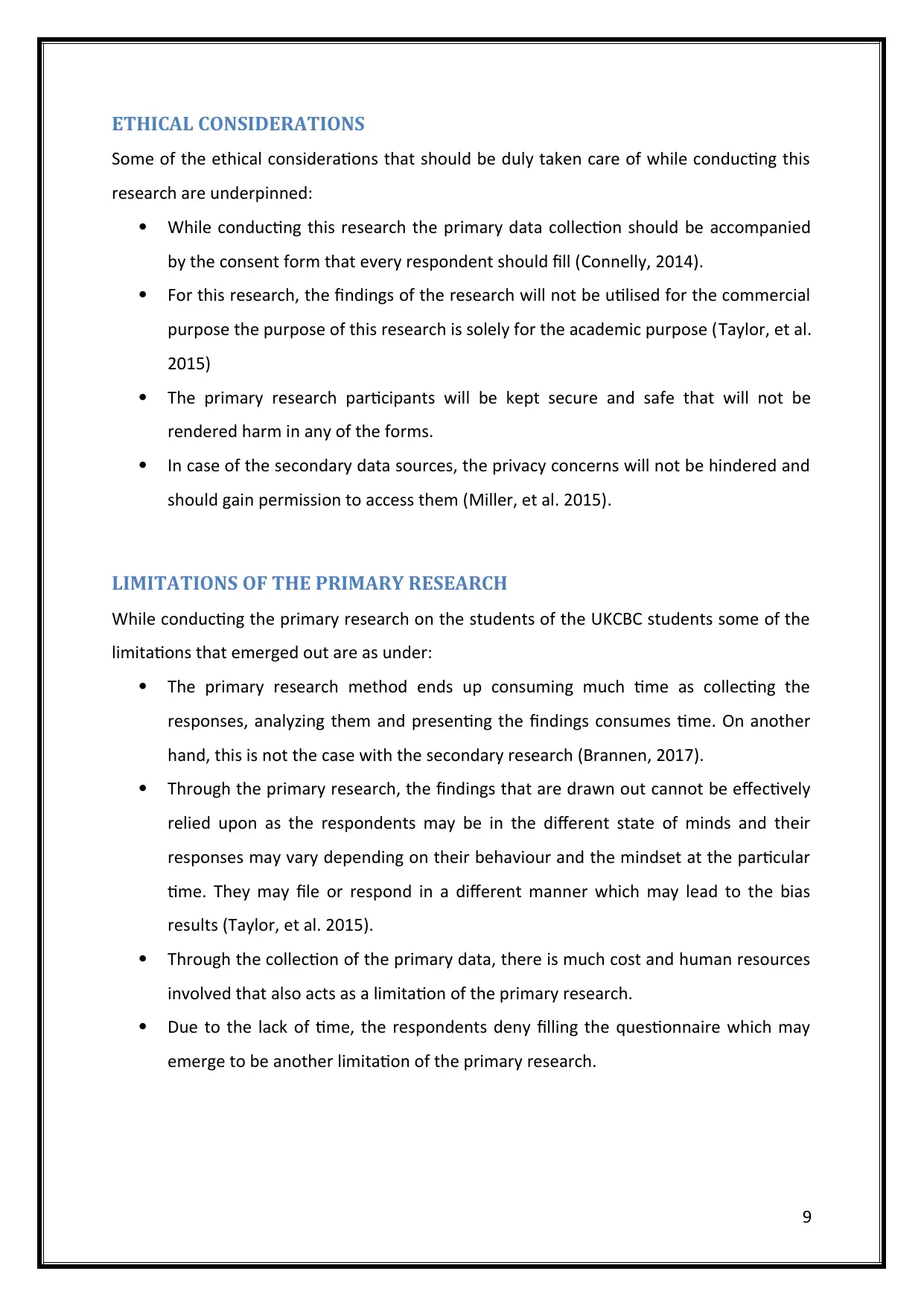
ETHICAL CONSIDERATIONS
Some of the ethical considerations that should be duly taken care of while conducting this
research are underpinned:
While conducting this research the primary data collection should be accompanied
by the consent form that every respondent should fill (Connelly, 2014).
For this research, the findings of the research will not be utilised for the commercial
purpose the purpose of this research is solely for the academic purpose (Taylor, et al.
2015)
The primary research participants will be kept secure and safe that will not be
rendered harm in any of the forms.
In case of the secondary data sources, the privacy concerns will not be hindered and
should gain permission to access them (Miller, et al. 2015).
LIMITATIONS OF THE PRIMARY RESEARCH
While conducting the primary research on the students of the UKCBC students some of the
limitations that emerged out are as under:
The primary research method ends up consuming much time as collecting the
responses, analyzing them and presenting the findings consumes time. On another
hand, this is not the case with the secondary research (Brannen, 2017).
Through the primary research, the findings that are drawn out cannot be effectively
relied upon as the respondents may be in the different state of minds and their
responses may vary depending on their behaviour and the mindset at the particular
time. They may file or respond in a different manner which may lead to the bias
results (Taylor, et al. 2015).
Through the collection of the primary data, there is much cost and human resources
involved that also acts as a limitation of the primary research.
Due to the lack of time, the respondents deny filling the questionnaire which may
emerge to be another limitation of the primary research.
9
Some of the ethical considerations that should be duly taken care of while conducting this
research are underpinned:
While conducting this research the primary data collection should be accompanied
by the consent form that every respondent should fill (Connelly, 2014).
For this research, the findings of the research will not be utilised for the commercial
purpose the purpose of this research is solely for the academic purpose (Taylor, et al.
2015)
The primary research participants will be kept secure and safe that will not be
rendered harm in any of the forms.
In case of the secondary data sources, the privacy concerns will not be hindered and
should gain permission to access them (Miller, et al. 2015).
LIMITATIONS OF THE PRIMARY RESEARCH
While conducting the primary research on the students of the UKCBC students some of the
limitations that emerged out are as under:
The primary research method ends up consuming much time as collecting the
responses, analyzing them and presenting the findings consumes time. On another
hand, this is not the case with the secondary research (Brannen, 2017).
Through the primary research, the findings that are drawn out cannot be effectively
relied upon as the respondents may be in the different state of minds and their
responses may vary depending on their behaviour and the mindset at the particular
time. They may file or respond in a different manner which may lead to the bias
results (Taylor, et al. 2015).
Through the collection of the primary data, there is much cost and human resources
involved that also acts as a limitation of the primary research.
Due to the lack of time, the respondents deny filling the questionnaire which may
emerge to be another limitation of the primary research.
9
Paraphrase This Document
Need a fresh take? Get an instant paraphrase of this document with our AI Paraphraser
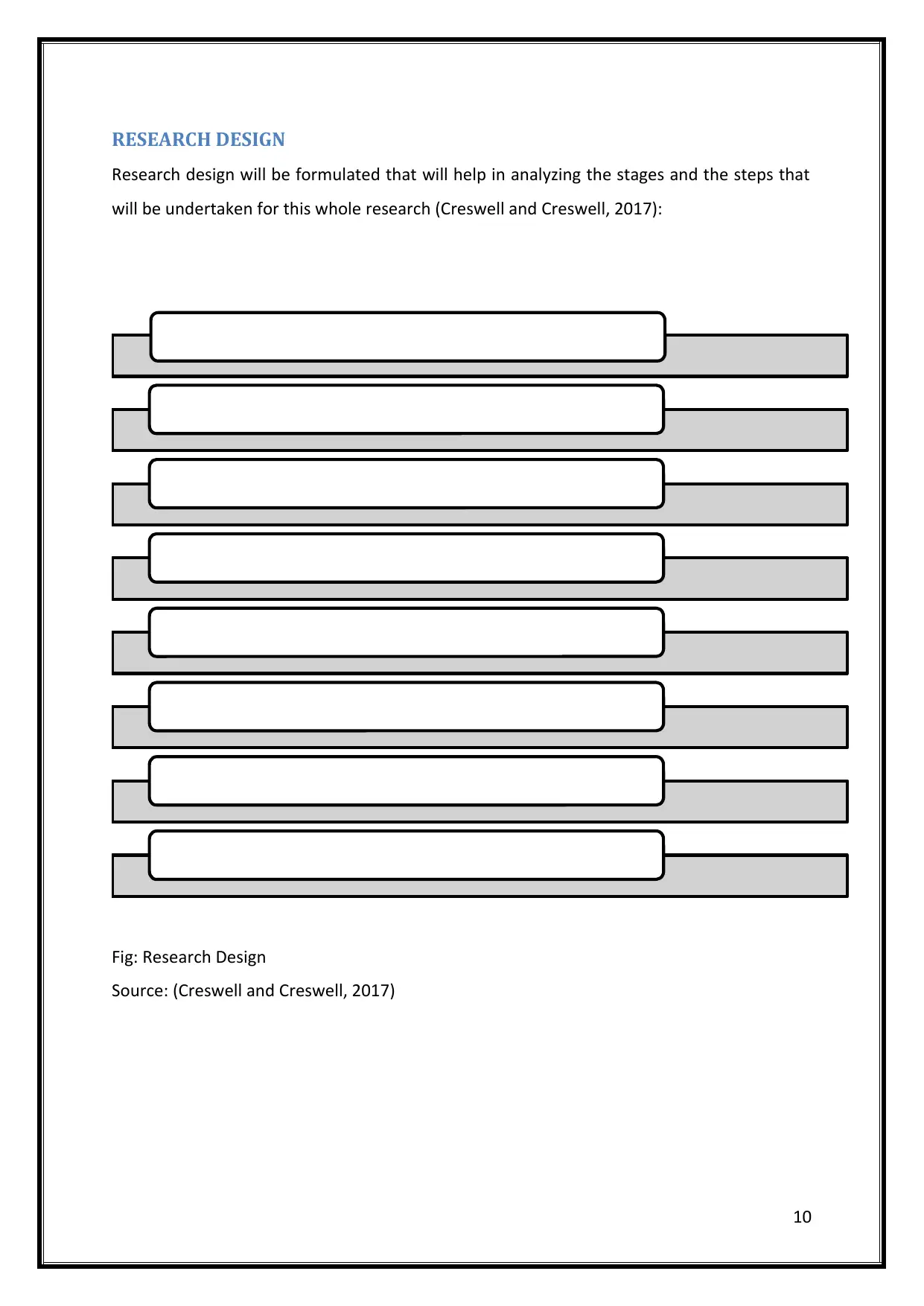
RESEARCH DESIGN
Research design will be formulated that will help in analyzing the stages and the steps that
will be undertaken for this whole research (Creswell and Creswell, 2017):
Fig: Research Design
Source: (Creswell and Creswell, 2017)
10
Project sepcification desigining
Defining the aims and objectoives
Conducting secodnary reserach and framing literature review
Reserach design
Primary reserach and data collection
Analysis of the data
Interpretation and reporting
Conclusion and Recommendations
Research design will be formulated that will help in analyzing the stages and the steps that
will be undertaken for this whole research (Creswell and Creswell, 2017):
Fig: Research Design
Source: (Creswell and Creswell, 2017)
10
Project sepcification desigining
Defining the aims and objectoives
Conducting secodnary reserach and framing literature review
Reserach design
Primary reserach and data collection
Analysis of the data
Interpretation and reporting
Conclusion and Recommendations
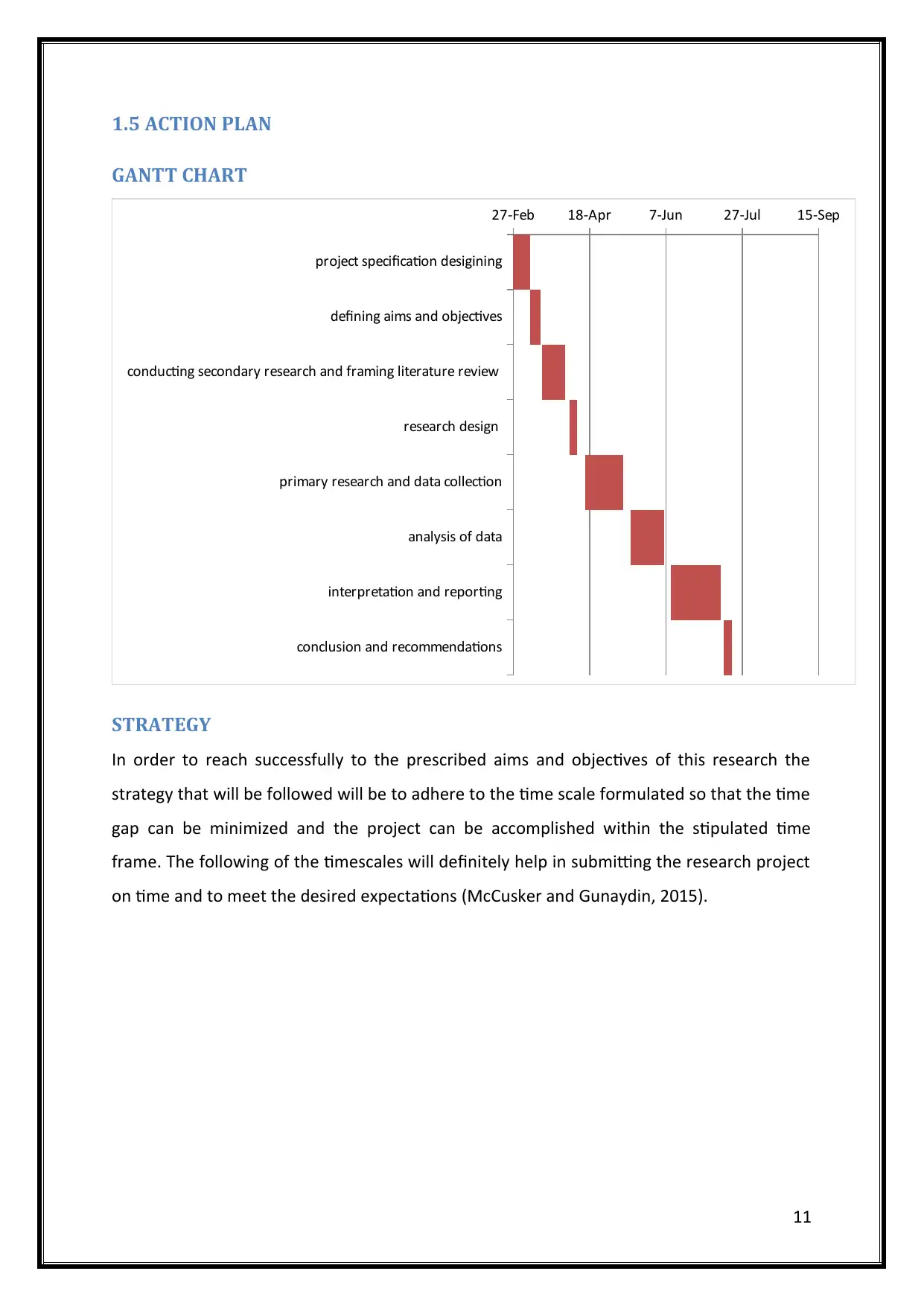
1.5 ACTION PLAN
GANTT CHART
project specification desigining
defining aims and objectives
conducting secondary research and framing literature review
research design
primary research and data collection
analysis of data
interpretation and reporting
conclusion and recommendations
27-Feb 18-Apr 7-Jun 27-Jul 15-Sep
STRATEGY
In order to reach successfully to the prescribed aims and objectives of this research the
strategy that will be followed will be to adhere to the time scale formulated so that the time
gap can be minimized and the project can be accomplished within the stipulated time
frame. The following of the timescales will definitely help in submitting the research project
on time and to meet the desired expectations (McCusker and Gunaydin, 2015).
11
GANTT CHART
project specification desigining
defining aims and objectives
conducting secondary research and framing literature review
research design
primary research and data collection
analysis of data
interpretation and reporting
conclusion and recommendations
27-Feb 18-Apr 7-Jun 27-Jul 15-Sep
STRATEGY
In order to reach successfully to the prescribed aims and objectives of this research the
strategy that will be followed will be to adhere to the time scale formulated so that the time
gap can be minimized and the project can be accomplished within the stipulated time
frame. The following of the timescales will definitely help in submitting the research project
on time and to meet the desired expectations (McCusker and Gunaydin, 2015).
11
⊘ This is a preview!⊘
Do you want full access?
Subscribe today to unlock all pages.

Trusted by 1+ million students worldwide
1 out of 34
Related Documents
Your All-in-One AI-Powered Toolkit for Academic Success.
+13062052269
info@desklib.com
Available 24*7 on WhatsApp / Email
![[object Object]](/_next/static/media/star-bottom.7253800d.svg)
Unlock your academic potential
Copyright © 2020–2025 A2Z Services. All Rights Reserved. Developed and managed by ZUCOL.




